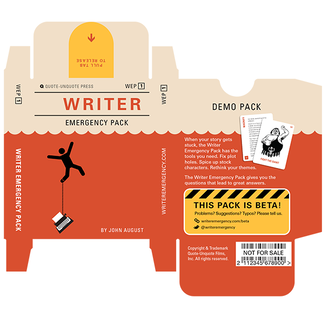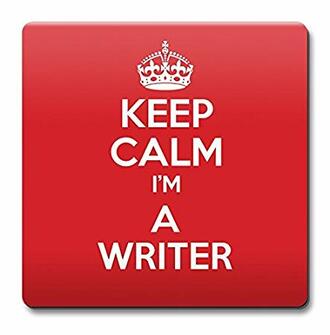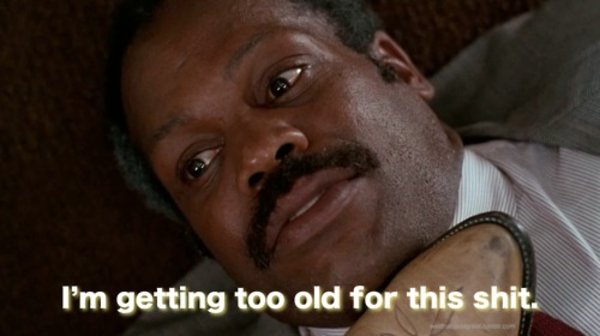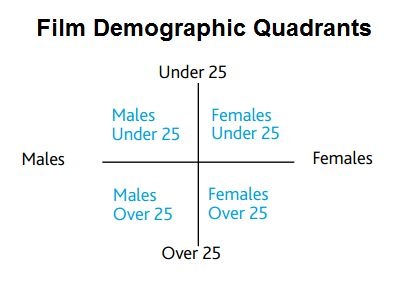|
Set yourself some writing goals. Quality should always trump quantity. 11 - 12 Months
0 Comments
12 weeks give or take.
Enough time to get this feature rewrite done. Pages written so far: 98 Finished for now. 27/4/2019 Pilot. 16 weeks give or take. Enough time to get a first draft written. Just need to figure out the story. Not too difficult then. Pages written so far: 59, 1st draft. Rough draft. Vomit draft. 27/6/2019 Pilot 16 weeks give or take. First draft. Just need to figure out the story. Not too difficult then. Pages written so far: 59, 1st Draft. 22/8/2019 Pilot 14 weeks give or take. FIrst Draft. Last project of the year. Pages written so far: 57, 1st Draft 12/09/2019 Pilot Final project of the year. Pages written: 54, 1st Draft 17/11/2019 Rewriting 14 weeks give or take. December 19th Yippee! When it comes to writing.
I don't think there's any one way of doing it. But if you're considering having a go at writing a pilot or two. Or more. This might help. This is the way I do it. And may be the reason why I watch so much TV. You can read all the books on writing, but I personally think the best way is to do this. 1. Get your hands on some pilot scripts. There are plenty of them on the internet. After watching so many TV shows this year, I wish the streaming services and networks would release the pilot scripts for them. Not sure if that's possible, but it would be awesome. There'll be a list of some pilots that you should definitely read below. 2. Once you have a number of these pilot scripts. Ten would be a good number to start with. DON'T READ THEM YET. 3. Find where these series are being shown. Streaming services. Networks. Or you could just buy them on Blu-ray. Then watch them. 4. Then read the relevant pilot script. 5. Look at how the story unfolds on the page, then compare the script to how the action and dialogue unfolds on the screen. 6. Look at the act breaks. Does the show have a TEASER? How many acts does the show have? Is it four or five acts? Do they stick a tag on the end? How long are the scenes? How many scenes are in an act? 7. But the most important questions for me personally? Does the pilot hold your interest? Are the characters interesting? Are the characters asking questions at the end of the pilot? Is the storyline interesting? How are the characters introduced? Is the story familiar, but also different to what you've watched before? 8. What type of series is this? A limited series with a limited number of epsiodes. Is this idea one that will last for more than one season? There are plenty of pilot scripts, but these are good ones to check out. Watch pilot. Read script. Watch pilot. Break them down.
Story taking too long to get going.
Get rid of pointless characters. Get rid of meandering scenes. Get rid of everything that's muddling and slowing down the story. If the 1st ACT isn't working. Get rid of it. Around this time last year I bought the following items. The mug was a birthday present for a nice girl. I do hope she didn't put me in a story and kill me, although I wouldn't blame her. I do hope she's still writing her novel. The Writer Emergency Pack and the coaster were bought to inspire me to start writing. My creative well had dried up at this point. Unfortunately, that didn't happen. They've been collecting dust on my desk for the last twelve months. With that said, I've just opened the Writer Emergency Pack and taken a quick look through the cards. Impressive. If you've come to a brick wall, and can't find a way over it, this deck of cards will go a long way to help. Obviously, it won't do the work for you, but the ideas will definitely get you thinking. Definitely recommend to all writers. Not just screenwriters. Can you use these pictures to create a story? Let's see.
What do we have here? A treasure map. A red dinghy. A gold key. A lighthouse. A hermit that hides away in a cave on the beach. A chunk of cobalt aura quartz. A red moon. An antique trunk. Let's throw in a mother and kids, or maybe a dad and his two teenage kids that have moved to the seaside for various (mysterious) reasons. Reasons that will be revealed to us as the story unfolds. What if the kids come across the hermit while on the beach? What if the hermit is somehow related to the kids or the parents? What if the single parent warns the kids to stay away from the hermit? What if the hermit is a relative or even one of the parents? What if the town sheriff isn't too keen on the new arrivals and tries to get them to leave the town? What if the town sheriff has their own agenda? Give yourself a goal. 1. One rewrite. Almost Done. Just needs a few adjustments. Setups and payoffs make sense. A little tinkering here and there. 2. New script. 3. Possibly a pilot script. And that's it. My goal for the year. Got characters doing the same thing.
Combine them into one character. If they're taking up too much screentime, and not adding much to the story. Get rid of them! Some do!
Some don't! But having a rough idea as to how your story starts, progresses and ends will certainly help when it comes to putting words on the page. This roadmap can be any length, long, short, fat or thin. And as detailed as you want it. Throw in some dialogue for good measure. Get some of those characters interacting and talking to each other. Pick a scene, and get writing. There's no single way to write a screenplay, but the more work you do beforehand will certainly help when it comes to the actual writing. Time to set some new writing goals.
New ideas. New storylines. New characters. Setting up the situation these characters find themselves in. Needs. Wants. Goals. Flaws. Protagonist vs. Antagonist. What and who is stopping them from achieving these goals? Currently, I'm working on my third rewrite of the year. At the start of the year, I made it a goal to rework three previous scripts, rather than start any new projects. This was my goal for a twelve-month period. As it stands, I seem to be on target, although getting this third concept to actually work is a lot trickier than I first envisioned. The concept and idea are there, but the actual execution of the story sucked somewhat in previous versions. Great idea! But this story is boring, slow, repetitive, and not much is really happening. Hence, the rewrite. But I'm going off on a tangent.
From experience, setting yourself realistic writing goals is a must. Otherwise, you end up putting way too much pressure on yourself, and not putting enough time, energy and thought into any one project. Writing a million screenplays in a year will not help you in any way, shape or form if they all suck! As for which project or projects you should consider working on after putting aside that current draft of the one you've just finished. Again, this is personal. Have you made a list? Do you have a folder on your laptop containing five possible ideas and projects that you're considering working on at some point? Out of those five, which of them have you visualized scenes, characters, an actual narrative for? How many notes have you made for each of those ideas? I have a list of four projects. Out of those projects, the two that I really want to write have by far the most notes. As I write this, I can see the opening scenes or sequence of scenes as the main characters are introduced in one of them. These opening scenes have been playing out in my imagination for quite some time. The same can be said of the other one. As for the third project, that's going to be a rewrite. Cutting a long story short. Which story or stories do you feel the most passionate about? If they're continually playing out in your head, eating away at you, nagging your subconscious, then you probably need to get that first draft down on paper. The One With The Agent
Excellent podcast. Very insightful. Go here! Query letters. Pitch Festivals. Script consultants. Script readers. That charge silly amounts of money for notes and feedback. Logline contests. 95 percent of screenwriting competitions. And the list goes on! These are all businesses that have been created for one thing. And that is to remove your hard earned money from your wallet, and bank account. They're there to make money. That's not to say you shouldn't pay someone a reasonable amount for their time, especially if you find their feedback useful and constructive. Just be weary of people that charge ludicrous amounts of money. Hundreds of dollars, thousands of dollars. They may come across as people in the know, but really, if they were that good, they'd be writing scripts and getting movies made, or at the very least, selling their scripts. 99.99 percent of the time, they're not. That's not to say that you shouldn't enter contests either. I only enter one contest a year, and that's just to see how my work stacks up against other writers. It's also a good way to set yourself a deadline. And, just because you're a quarter or semi-finalist, doesn't mean you have a badly written script, it just means it didn't gel with whoever was reading it at the time. So keep at it. It's your writing that matters. And the stories you tell. Correcting punctuation and grammar.
Sentence construction, and how the story is laid out on the page. While the above is important, this is not rewriting. You might well smile with relief on finishing that first draft. But don't be fooled. You have plenty of work ahead in getting that script up to scratch. Firstly. Don't be frightened of getting some feedback on that story you've just finished. Ideally from some trusted sources. Or at the very least, from people who write themselves, and know something about creating story. A lot of writers shy away from getting feedback because they're worried about being told that what they've written isn't very good. But that's the point. You need to know what's working and what's not. Secondly. Once you've received feedback, put that finished script and the notes away for a while. Two weeks. Three weeks. A month. Several months. A year! Step away from it. Step back. Put it out of your mind. Forget about it. Thirdly. Be productive while stepping away from this newly finished project. Start work on the next project that's been bugging you. Make some notes. Come up with some new ideas. Characters. Scenes. Write an outline for this new project. You could even write the first draft. Fourthly. Once you feel you've been away long enough, go back to the project. Read through the notes you've received. Then read through the script. See what works, and what isn't. A boring first act? Perhaps the second act is dragging? Characters that don't appear to be doing anything? Just because someone has mentioned something, doesn't mean it's right. It doesn't mean it's wrong either. Consider writing a new draft based on feedback that you like. Then consider writing another draft based on the feedback that you're not too keen on. Who knows? You might find that you like that draft. Fifthly. Take a break. Re-energize those creative juices. Then repeat the process. You need to be constantly writing to be in this. Because if you're not, someone else will be! This is Sarah.
Even though she looks in the mirror every day, and men drop at her feet with their tongues hanging out whenever she walks into a bar. For some strange, inexplicable reason she just doesn't realize how beautiful she is! Scriptnotes. Wardrobe, hair, makeup. As much as it pains some writers.
You need to get your work out there by any means possible. To see how it stacks up. Having a script sitting on your computer or hidden in a drawer won't be doing you a whole lot a good. If you can afford it, why not try a contest or two. A good place to start would be the following: The Academy Nicholl Fellowships in Screenwriting The Austin Film Festival PAGE International Screenwriting Awards There are a few others worth checking out. Do your research! A new year.
Means a new set of goals. Be realistic in what you want to achieve. Working on too many projects might mean you're spreading yourself far too thinly, and not giving enough time and effort to any one writing project. What if this scene goes here, rather than there?
What if this character does this, rather than that? How will the story change if I remove this character? Will the story be better if I introduce this character or group of characters much earlier on? What if I use the 3rd Act as the opening instead? What if I change the sex or age of my protagonist? What if I change the goals these characters are trying to achieve? What if? What if? What if? Just because you've written it on the page, doesn't mean it has to stay that way. Good thing about words, they can be rewritten. Don't settle for that 1st draft. Keep developing the characters. The story. Write them down.
They might well be a starting point for a story. A character that you've dreamed up. A situation that this character finds themselves in. Perhaps you have an ending in mind for a story. How will you get to this ending? Getting this character or group of characters from A-to-B-to-C and so on. A scene that keeps playing out in your head that you can't get rid of. A bit of dialogue. A bit of action. What if this happens? What if that happens? What's the essence of this story? What's it really about? |
Welcome to Russell’s website. A storyteller who enjoys writing screenplays for movies. Even though the process is hard. It keeps his imagination working overtime.
Categories
All
Blog Archives
March 2021
Take a Look
WCMartell
John August Wordplay Craig Mazin Done Deal Pro Movie Bytes London Screenwriters' Festival Screenwriting from Iowa Bang2Write Chris Jones Blog Go Into The Story UK Scriptwriters Nerdist Writer's Panel Deadline The Bitter Script Reader ScreenwritingU Screenplay.com Corey Mandell The Hollywood Reporter Variety WGAW U.S. Copyright Office Inside Film Magazine Screen International Scriptchat Save the Cat The Black List Writers & their Blogs
The Scriptwriter
David Sartof Scripting Life Bamboo Killers Selling Your Screenplay Script Doctor Eric Geoff La Tulippe |
















 RSS Feed
RSS Feed
